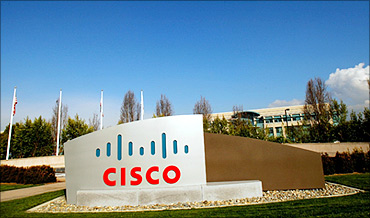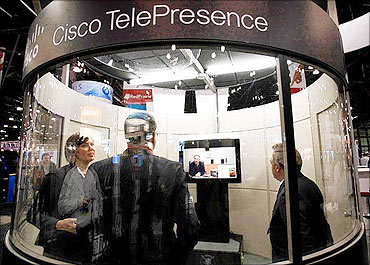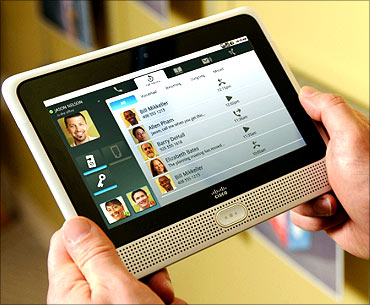 | « Back to article | Print this article |
Cisco can transform business travel
An out of the box face-to-face virtual meeting solution from Cisco could change the world for frequent business travellers and allow them to communicate instantly and conveniently over long distances straight from their desktops.
For example, the new Cisco TelePresence EX60 - part of the EX Series - can not only be used with a telepresence system offering interactive touchscreen and lifelike video in large-screen format but is also designed for desktops, laptops and subsequently for mobile phones.
Cisco Systems Managing Director of Collaboration in Asia Pacific Dinesh Malkani cannot stop talking about the product that helped him reduce his travel time whether he was separated by a hallway, a street, or several time zones.
Cisco can transform business travel
"The voice (call) is successful as it has made easier for people to connect each other with the help of mobile phones.
"If one can have video as well as voice on the device of his choice whether it is a mobile phone, tablet PC or desktop, this will significantly help in increasing video adoption."
Much of Cisco's effort is focused on making these devices video-enabled either on its own or with the help of partners and operators and Malkani believes he is heading one of the most ambitious ventures of the company.
Cisco can transform business travel
The company has managed to cut costs of around $771 million on travel so far with 984 Cisco-on-Cisco rooms, 252 private TelePresence rooms and by conducting 849,481 scheduled TelePresence meetings.
The company's pervasive strategy has evolved from the demands of global businesses today - a workforce that has got mobile.
And the video strategy ensures that a person can have access to video conferencing from any part of the world using a device of his choice.
Cisco can transform business travel
Cisco's acquisition of Webex in 2007 and high-definition video conferencing solution provider Tandberg in 2009 were clearly moves to drive the video strategy forward.
Powered with its video platform like the TelePresence and combining the capabilities of Tandberg and Webex, Cisco is all set to bring in a revolution in the collaboration applications market with its "pervasive video" offerings.
Cisco's Tandberg also offers on-demand video solutions on desktops or mobile devices for an annual, daily or hourly subscription. With a nominal fee, a person using a camera phone can download the software from the Webex website and start video conferencing with someone who has Webex.
Cisco can transform business travel
Cius will be loaded with all the collaboration applications, which can also work as a computing device with data hosted in the cloud. Other than video and computing capability supporting 3G, 4G and wi-fi systems, Cius will also work as an IP phone.
To drive video adoption further, Cisco plans to make all its IP phones video-enabled and make it available at the same price point of a voice IP phone.
"Every Cisco IP phone we ship henceforth will give the customer both voice and video, at the same price. Of course, having video available on all our IP phones also means that video adoption will go up very significantly," says Malkani.
In India, Cisco has installed 70 TP system and the number is expected to grow faster.






